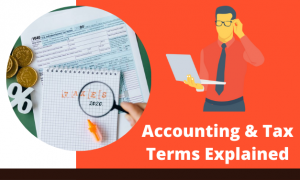Accounting & Tax Terms Explained
Publicado por Annaa lee
Cuerpo
What Is Tax Accounting?
Tax accounting is a kind of structure that comes inside the accounting methods that only focused on the taxes instead of the looks of public financial statements. Further, Tax accounting is governed by the interior Revenue Code, which dictates the precise rules more over the companies along with the individuals that should have to follow whenever they want to prepare their tax returns.
As there are not everyone has the proper knowledge about accounting or they don’t have any kind of degree. If you are implementing with the accounting software inside your small type of business or somewhere hoping that to speak better together with your accountant, want to know some of the basic accounting terms can assist you and somewhere interface more effectively along with the business world. We have already have managed a number of important accounting terms that further supply you that an honest start in navigating the accounting.
Types of Tax Accounting
Tax Accounting for a private
For a private taxpayer, tax accounting look at different kind of items like income, qualifying deductions, gains or losses in an investment, and some other transactions that further may affect to the individual’s tax that already is in burden form. This kind of limited quantity regarding data is an essential term for a private for managing a kind of annual income tax return, and while tax accountants are often employed by a private, it is not a legal requirement. Moreover, there is general accounting that always includes controlling all kinds of funds that may come from anywhere in and out of the persons' possession no matter the aim, that further including personal expenses that haven't any tax implications.
Tax Accounting for a Business
As with the help of a business perspective, there is plenty of information that is further analyzed as a part of the tax that comes under the accounting process. Whereas earing of the company or the different kinds of incoming funds. So, these all should be in proper control even as they are for the individual, there is a further level of complexity about the outgoing processes regarding funds that are further directed towards certain business obligations. This will also include some of the funds that come directly with the specific business expenses also as funds directed further towards shareholders as well.
Balance Sheet Terms
Balance Sheet
A record or a kind of summary report that further shows you about the company’s assets which means what it owns by them, liabilities, and equity. The record always reflects the assets, liabilities, and equity of the company at intervals, instead of over a variety.
Asset (A)
An asset is anything that with the corporation means owns. All assets have what's mentioned are convertible value, that further means that they might be sold for cash. According to the record, assets are listed during a specific order that further supported their liquidity, starting with cash which is mostly in form of liquid, and ending with land that further includes vehicles, equipment, and assets. In this, that is further classified into different parts that current and fixed assets.
Liability (L)
A liability may be a form of debt that a corporation owes to a different company or person. These are also further classified into two sorts of liabilities: current (CL) and long-term (LTL).
Current liabilities are debts that will be paid in between a year such as credit cards and accounts payable.
Long-term liabilities are debts that can be paid over an extended period of your time some of them are long-term financing (loans or mortgages).
Actually, these all are further classified in many different parts and these all are managed by the company which is not that much easy task so there is the option that is outsourcing accounting services in uk and you enjoy all of the relaxations which are provided by experts.













Comentarios